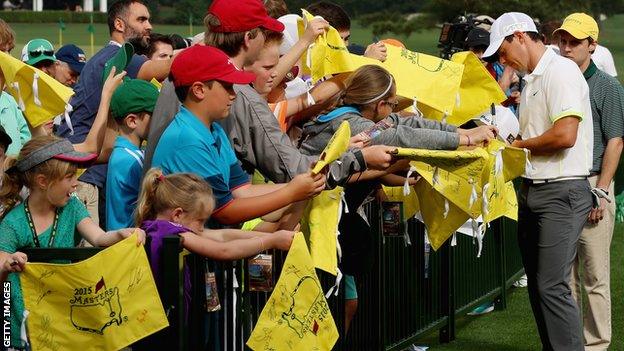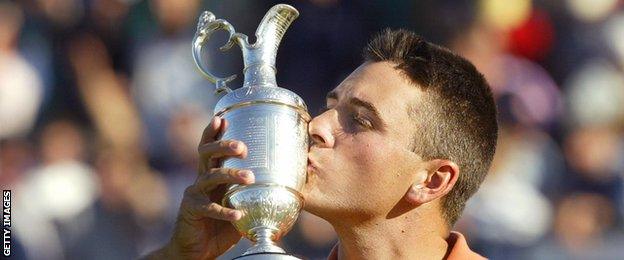Masters, The Open, US Open, US PGA Championship - which is the biggest major?
- Published
- comments

McIlroy desperately wants to win the Masters to complete the Grand Slam
If nothing else, Rory McIlroy has stirred up a delicious debate with his assertion that the Masters is "the biggest tournament in the world".
The 29-year-old from Northern Ireland toned down last week's initial comments that he did not care about The Open and the US Open, but stands by his belief that, among the majors, the Masters is "a notch above the others".
Ranking the standing of tournaments is a delightful exercise for all golf fans and in that spirit I feel compelled to respectfully disagree with McIlroy. It is sure to be a topic of discussion in Wednesday's latest edition of The Cut, the BBC golf podcast.
This is especially the case in the week of the Players Championship at Sawgrass, a massive tournament that strives to sit at golf's top table alongside Augusta, the Opens and the US PGA Championship.
It is easy to see why McIlroy rates the Masters so highly. It is the one major to have eluded him and the tournament he most wants to win.
That appetite can only have been further increased in the wake of squandering an excellent chance of landing a first Green Jacket last month.
McIlroy was only three shots behind Patrick Reed going into the final round but finished six shots behind him
The Augusta National gets pretty much everything just right. Their immaculate course is the only one that stages a men's major every year.
Tradition and history are at the heart of a tournament that constitutes golf's most glamorous week. And the fact that it is eight months since the most recent major further stokes the sense of anticipation everyone feels at Augusta every April.
Furthermore, it is the most elite and exclusive major field of them all. Only the best in the world, former champions and the odd invite from Asia - where Augusta wants to spread its global footprint - get to play the Masters.
Golf's greatest player, Jack Nicklaus, has six Green Jackets. Tiger Woods, the man who has arguably played to a higher level than anyone else, is a four-time winner.
The tournament continues to identify champions of the highest calibre. In the past five years, each winner has been ranked inside the world's top 12 at the time of their triumph.
But is the Masters the biggest tournament in the world? It may be for McIlroy, but I would still put The Open at the very top.
The original and the best?

American rookie Ben Curtis won the 132nd Open Championship at Royal St George's in 2003, ranked 396th in the world
It is the original major, the one - they say - that leaves us with the "Champion Golfer of the Year". Whoever triumphs has conquered not just a great golf course but a field drawn from all over the world.
They have also contended with conditions far more variable than we ever see at Augusta and it is played on a seaside links, the original form of golf that requires imagination and a multi-dimensional set of skills.
The Open can be won by a player ranked as low at 396 in the world, as Ben Curtis proved in 2003., external
A 59-year-old great can still contend in this form of the game, as five-time champion Tom Watson showed at Turnberry in 2009.
And 40-somethings with the guile and craft of years on the golfing treadmill, such as Darren Clarke and Ernie Els, can take down the young tyros.
The statistics show though that the Claret Jug is more likely to fall into the clutches of the world's elite - as Nicklaus, Woods and, indeed, McIlroy have proven.
Despite all the advances in technology, golf on the British seaside remains as relevant as ever. The Open produces stellar champions and in the past five years the average world ranking of its winners is 8.2 - the lowest of the four majors.
All these facets help make The Open the greatest golf tournament in the world - and what is more, unlike the Masters we can all go and watch it.
The US Open, traditionally the most attritional of the majors, is the United States' national championship. It carries huge prestige, but too often the story is the course rather than the player.
That would be number three on my list, with the US PGA Championship fourth - although that is the only one of the quartet to have been won by a reigning world number one - McIlroy in 2014 - in the past five years.
The fifth major?
If that is a metric - and it is worth considering - the Players comes into the picture because twice during this period the world's top player of the moment has won at TPC Sawgrass. Woods was world number one when he won in 2013 and Jason Day was top dog two years ago.
However, this week's defending champion Si-woo Kim was ranked 73rd when he completed his shock victory 12 months ago.
The Players is the PGA Tour's flagship event. It claims to have the deepest field in golf and they will be chasing $11m (£8.1m) in prize money this week, a fund that sits alongside the majors.
The tournament has its own place in the golfing firmament with the punishing layout that includes the famous island green on the par-three 17th.
But the fact is golf has only four men's majors, then comes the Players.
It will be interesting to see how the standing of the majors alters with the upcoming calendar changes. The US PGA Championship is moving from August to May from next year and will no longer be the last one on the calendar.
Traditionally the fourth of the big four in terms of date and standing, it will feed off the buzz generated by the Masters, while the Players switches to its old March date.
This could add to its lustre because it will be the first big-name gathering with true resonance since The Open the previous July. However, it has to guard against being lumbered with the tag of being a pre-Masters warm up.
One element remains unarguable. Whichever of the big four it is, the golfer who wins will have etched themselves into the history of the game.
The Players can't quite say that with the same certainty, but it is not far off.